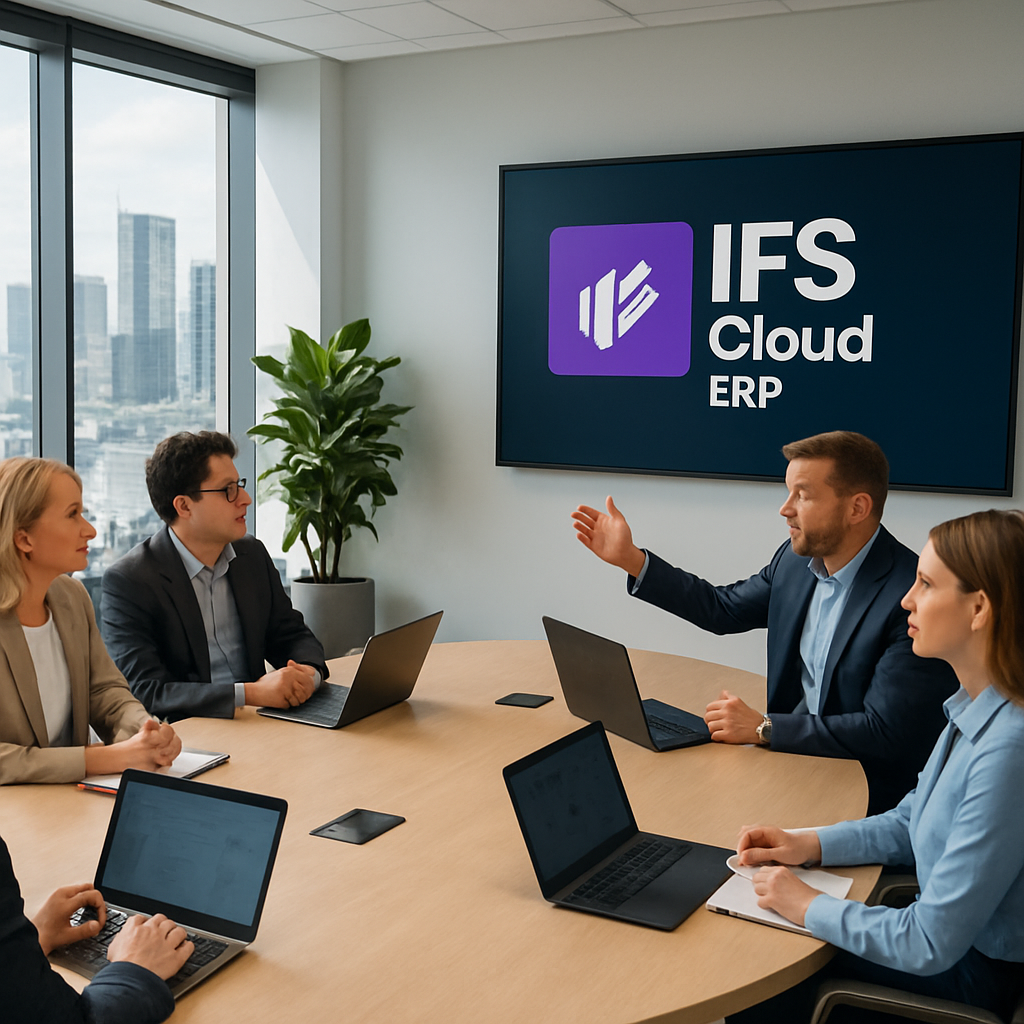IFS vs Infor M3: A 2026 Head to Head ERP Software Comparison
The decision to invest in a new ERP is all about preparing your manufacturing business for the future. With the global ERP software market on a path...
8 min read
Bri Dascher
:
Nov 18, 2025 12:00:00 AM
Artificial Intelligence (AI) is no longer a future concept—it’s already reshaping how ERP systems operate. Once viewed mainly as record-keeping platforms, today’s ERP solutions use AI to forecast demand, detect risks, automate decisions, and uncover insights in real time. This article explores how IFS applications apply AI to strengthen planning, compliance, and performance for organizations in 2026.
As we navigate 2026 and evolving manufacturing trends, 'generic AI' is being replaced by specialized Industrial AI. IFS has led this charge with IFS.ai, a set of capabilities embedded directly into the core of IFS Cloud.
The standout feature is the IFS.ai Copilot, which acts as an intelligent assistant for your workforce. Unlike basic chatbots, Copilot can analyze complex asset data to predict failures before they happen, automatically schedule field technicians based on real-time traffic and skills data, and even draft optimization reports for executives. It transforms your ERP from a system of record into a system of action.
Here's the deal: manufacturing products in our globally linked world, with costs and legislative changes on one hand and sustainability needs and a tech explosion on the other, can be a tough row to hoe. But there's a silver lining: IFS Applications. This software packs capabilities that not only help manufacturers understand their business better but also streamline dormant processes. And the best part? It has what it takes to manage a manufacturing business today.
By using IFS ERP, your business can take operational efficiencies up a notch, ace customer service, and turn data into tangible business value. And you can achieve all this at various crucial stages of the manufacturing process:
Planning and scheduling: The folks at IFS are bringing AI into play to supercharge optimization capabilities on the advanced planning board. This means production lines can be used more efficiently, and production needs can be met perfectly.
Production: By marrying historical data within IFS with the latest product, order requirements, and scenario analysis, businesses can schedule or reschedule production resources on the fly.
Finance: Here's where machine learning comes in handy. It provides enterprise-wide financial insights that let manufacturers make commercial forecasts with more certainty. Plus, IFS also has a knack for pattern-matching to swiftly pinpoint any hiccups in budgeting and forecasting.
Procurement: AI can give a general purchase strategy the magic touch, making it more dynamic and less reactive. You can make smart decisions to anticipate or delay purchases by analyzing market trends, paving the way for a smoother procurement process.
Warehousing and distribution: IFS data isn't just data; it's the conductor of a robotic materials handling orchestra. Take this for example: a client’s robot fleet can autonomously transport heavy raw materials to the manufacturing production line and bring finished goods to the warehouse.
Customer relationship management: Companies using IFS are making the most of chat bots, self-service technology, and intelligent process automation in call-centers and field service environments. The result? Happier customers and more effective call handlers.
Product lifecycle management: Intelligent automation can guide you on what operational data should be kept and how it can be a money-spinner. It can also sniff out and cut down errors and figure out if the data should be stashed in the ERP or fetched from outside.
The point is, AI and ERP are different but when they join forces, magic happens. Big shots like Microsoft and Google are heavily investing in AI and have launched standalone AI platforms such as OpenAI's Chat GPT and Bard. Along the same lines, IFS and a few other ERP software providers are weaving AI technologies like machine learning into their ERP systems.
When it comes to reshaping our understanding of ERP software, artificial intelligence (AI) is the trailblazer leading the charge. One of the major paradigm shifts AI brings to the table is a focus on the fundamental importance of data. Now, you might be thinking, "Why does data matter so much in an AI-driven ERP landscape?" Let's explore.
Here's the simple truth: AI thrives on data. The better the quality of the data - reliable, accurate, and comprehensive - the more effectively AI can perform. This interdependence has nudged data into the spotlight, cementing its central role in ERP software implementations - a position it always warranted but wasn't always given.
What's fascinating about this data focus is that it extends beyond the internal data sources. Of course, keeping your product and customer information accurate and clean is crucial. But AI allows us to broaden our scope and tap into third-party data sources.
Take a retail organization, for example. Predicting demand often feels like a shot in the dark. However, with AI, we're no longer limited to studying historical trends and customer patterns. We can integrate external data like weather information, factors that might influence consumer behavior, and use these to make more accurate demand forecasts.
This holistic approach to data brings into focus the potential of predictive modeling, and with it, an opportunity to keep ahead of the game. By blending a wealth of data into AI models, companies can gain a deeper understanding of future possibilities, enabling them to make more informed strategic decisions.
This new perspective on data within ERP systems brings about a major shift - viewing data not just as records of transactions but as a crucial competitive advantage. Organizations are being encouraged to revamp their data strategies and to leverage data as a vital resource in gaining an edge over their competitors.
Beyond the spotlight on data quality, there's another game-changer in the mix - artificial intelligence (AI) is becoming a powerful ally in enhancing employee efficiency. By smartly leveraging AI, we can amplify the unique strengths and skills of our workforce, taking their productivity to the next level.
Here's the interesting part: AI's strength lies in taking on routine, repetitive, and low-value tasks that often consume a chunk of the workforce's time. With AI shouldering these tasks, the result is simple: employees can focus on high-value tasks at lower costs, resulting in enhanced productivity.
Think about ERP software providers incorporating AI platforms for simplifying information retrieval. Gone are the days when employees needed to wade through multiple menu options or remember complex transaction codes to find specific information. Now, all they have to do is ask AI or use an AI interface to fetch the needed data. What matters isn't where the information lies within the system, but how well the query is formulated. It's a classic illustration of AI's ability to conserve employee time, offering numerous avenues to boost efficiency.
The convenience that AI brings to the table goes a long way in not just making employees more efficient, but also in simplifying their jobs. It's fair to say that user-friendly access to crucial information should have been a basic feature in ERP systems. But it's the introduction of AI that's finally turning this into a reality, bringing the efficiency of accessing crucial information to an entirely new level.
AI's integration into ERP systems is revolutionizing the way businesses operate. From improving data quality to boosting employee efficiency, AI is leading the charge in transforming the ERP landscape, laying the foundation for a more productive and efficient work environment.
Artificial intelligence (AI) is proving to be a key player in enhancing the utility of ERP software by making employees more effective. It's not just about efficiency – AI provides employees with the tools to extract maximum value from the systems and technologies they're working with. This leap in effectiveness stretches beyond simpler access to information; it provides employees with previously inaccessible models, information, and predictive analytics.
A frequent worry is that AI might eventually replace jobs. And while there may be some truth in this concern, it's also essential to highlight the myriad of opportunities AI brings along. Not only does AI open up new roles and responsibilities, but it also bolsters the effectiveness of existing positions.
Imagine arming employees with AI-enabled tools and insights, empowering them to process vast quantities of data at a speed and scale beyond human capabilities. AI in this context becomes an enhancer, not a replacer, for human roles.
In conclusion, AI's integration with ERP systems isn't just about ramping up efficiency. It's also about boosting the overall effectiveness of employees. By leveraging AI within ERP systems, we can enhance the value employees bring to their roles, allowing them to make more impactful decisions, perform tasks more accurately, and operate at a higher level of effectiveness.
As AI continues to evolve and make inroads into the ERP landscape, it's clear that it's not just a valuable asset but a game-changer. It's time we harnessed this power to not just increase efficiency but also augment the effectiveness of our workforce.
ERP systems historically have had a reputation of being expensive, high-risk undertakings that often fail to deliver meaningful value. But the rise of artificial intelligence (AI) is allowing us to reevaluate this perspective. With AI integration, we can transform ERP systems into powerful platforms that enhance employee efficiency, increase organizational effectiveness, and provide access to previously unreachable insights.
The perception shift is particularly critical as organizations are becoming increasingly cautious of the risks and expenses associated with ERP software deployments. Especially within the private equity sector, where investments are typically centered around mid-market and high-growth companies, the focus is on creating value, not merely adopting technology for technology's sake.
In this context, the integration of AI with ERP software aligns perfectly with this outlook. The merging of these powerful technologies breathes new life into legacy ERP software, transforming it from a cost center into a value-creating powerhouse.
Looking ahead, we can expect AI to keep driving value creation within ERP systems. The focus is shifting away from the back-office functions that traditionally offered limited value. Instead, organizations are harnessing AI's power to improve high-value areas that enhance both customer and employee experiences, ultimately boosting the return on investment from technology deployments. The era of viewing ERP systems as cost centers is fading; the future lies in leveraging them as valuable assets for organizational growth and competitiveness.
AI is redefining the rules of ERP software, putting an emphasis on data at the heart of this revolution. Businesses that adapt to these AI-powered ERP systems will gain the ability to streamline processes, improve both customer and employee experiences, and make strategic decisions based on comprehensive data insights. We're seeing an exciting evolution of ERP software that equips organizations with the tools they need to remain competitive in a constantly changing business landscape.
With the combined strengths of AI and ERP systems, we're no longer limited to just examining historical trends and customer behaviors. We can now incorporate external data, like weather information and other pertinent factors, resulting in richer, more accurate demand predictions.
Looking ahead, AI is projected to continue driving this shift from mundane back-office functions to high-value areas that amplify customer and employee experiences. This change is particularly significant for industries like private equity, where value creation is a key focus, leading to enhanced returns on technology investments.
In essence, AI is disrupting the ERP software world and urging organizations to be more strategic with their tech deployments. The fusion of transactional back-office data from ERP software with AI provides a more profound understanding of an organization's structure and potential future scenarios. This enables more informed decision-making and actions that are aligned with the broader organizational goals.
AI is significantly reducing the time spent on manual tasks and information retrieval, allowing for more focus on contemplation, observation, and deriving insights from AI models. This sets the stage for more effective decision-making and actions that resonate with your organization's long-term vision.
"In the arena of digital transformation, we're witnessing a powerful alchemy – the fusion of artificial intelligence with enterprise resource planning. This not only broadens our horizons but truly empowers organizations to leap beyond the traditional barriers of process optimization and strategic decision-making. With AI and ERP hand in hand, we're not just following the curve; we're pioneering a new trajectory in operational excellence and value creation."
Blake Snyder, Chief Growth Officer at Astra Canyon Group
It's a transformative time for ERP software, particularly with systems like IFS Applications, as AI continues to revolutionize how we perceive and utilize these vital tools.
AI in ERP systems refers to the integration of machine learning, predictive analytics, and automation to improve planning, compliance, and operational efficiency.
IFS ERP leverages AI to optimize planning, financial forecasting, supplier performance, asset management, and customer engagement. It turns ERP into a proactive system that provides real-time insights.
Key benefits include improved demand forecasting, better compliance management, reduced manual work, enhanced workforce productivity, and stronger customer engagement.
No. AI in ERP is designed to assist employees by automating repetitive tasks and providing insights, allowing staff to focus on higher-value responsibilities and decision-making.
Astra Canyon Group combines deep ERP expertise with proven IFS implementations, helping organizations successfully adopt AI-driven ERP strategies for measurable results.
AI in ERP is not a future promise—it’s already reshaping how organizations operate. Astra Canyon Group brings deep expertise in IFS ERP and AI-enabled transformations, helping businesses harness advanced automation, data-driven insights, and industry best practices.
Work with Astra Canyon to deploy AI-powered ERP strategies that increase efficiency, ensure compliance, and position your organization for sustainable growth in 2026 and beyond.

The decision to invest in a new ERP is all about preparing your manufacturing business for the future. With the global ERP software market on a path...

Equipment failure can halt production, disrupt supply chains, and inflate operational costs. In asset-heavy industries like manufacturing, energy,...

Effective business management hinges on efficiently handling complex operations, and IFS Cloud ERP offers a robust solution designed to meet these...